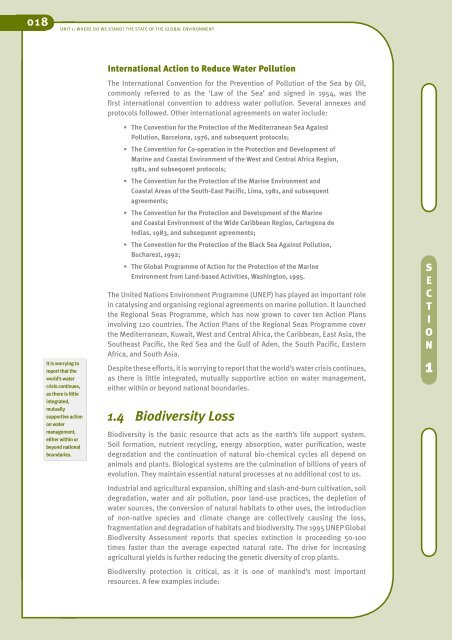Online version: PDF - DTIE
Online version: PDF - DTIE
Online version: PDF - DTIE
You also want an ePaper? Increase the reach of your titles
YUMPU automatically turns print PDFs into web optimized ePapers that Google loves.
018<br />
UNIT 1: WHERE DO WE STAND? THE STATE OF THE GLOBAL ENVIRONMENT<br />
It is worrying to<br />
report that the<br />
world’s water<br />
crisis continues,<br />
as there is little<br />
integrated,<br />
mutually<br />
supportive action<br />
on water<br />
management,<br />
either within or<br />
beyond national<br />
boundaries.<br />
International Action to Reduce Water Pollution<br />
The International Convention for the Prevention of Pollution of the Sea by Oil,<br />
commonly referred to as the ‘Law of the Sea’ and signed in 1954, was the<br />
first international convention to address water pollution. Several annexes and<br />
protocols followed. Other international agreements on water include:<br />
• The Convention for the Protection of the Mediterranean Sea Against<br />
Pollution, Barcelona, 1976, and subsequent protocols;<br />
• The Convention for Co-operation in the Protection and Development of<br />
Marine and Coastal Environment of the West and Central Africa Region,<br />
1981, and subsequent protocols;<br />
• The Convention for the Protection of the Marine Environment and<br />
Coastal Areas of the South-East Pacific, Lima, 1981, and subsequent<br />
agreements;<br />
• The Convention for the Protection and Development of the Marine<br />
and Coastal Environment of the Wide Caribbean Region, Cartegena de<br />
Indias, 1983, and subsequent agreements;<br />
• The Convention for the Protection of the Black Sea Against Pollution,<br />
Bucharest, 1992;<br />
• The Global Programme of Action for the Protection of the Marine<br />
Environment from Land-based Activities, Washington, 1995.<br />
The United Nations Environment Programme (UNEP) has played an important role<br />
in catalysing and organising regional agreements on marine pollution. It launched<br />
the Regional Seas Programme, which has now grown to cover ten Action Plans<br />
involving 120 countries. The Action Plans of the Regional Seas Programme cover<br />
the Mediterranean, Kuwait, West and Central Africa, the Caribbean, East Asia, the<br />
Southeast Pacific, the Red Sea and the Gulf of Aden, the South Pacific, Eastern<br />
Africa, and South Asia.<br />
Despite these efforts, it is worrying to report that the world’s water crisis continues,<br />
as there is little integrated, mutually supportive action on water management,<br />
either within or beyond national boundaries.<br />
1.4 Biodiversity Loss<br />
Biodiversity is the basic resource that acts as the earth’s life support system.<br />
Soil formation, nutrient recycling, energy absorption, water purification, waste<br />
degradation and the continuation of natural bio-chemical cycles all depend on<br />
animals and plants. Biological systems are the culmination of billions of years of<br />
evolution. They maintain essential natural processes at no additional cost to us.<br />
Industrial and agricultural expansion, shifting and slash-and-burn cultivation, soil<br />
degradation, water and air pollution, poor land-use practices, the depletion of<br />
water sources, the con<strong>version</strong> of natural habitats to other uses, the introduction<br />
of non-native species and climate change are collectively causing the loss,<br />
fragmentation and degradation of habitats and biodiversity. The 1995 UNEP Global<br />
Biodiversity Assessment reports that species extinction is proceeding 50-100<br />
times faster than the average expected natural rate. The drive for increasing<br />
agricultural yields is further reducing the genetic diversity of crop plants.<br />
Biodiversity protection is critical, as it is one of mankind’s most important<br />
resources. A few examples include:<br />
S<br />
E<br />
C<br />
T<br />
I<br />
O<br />
N<br />
1
















